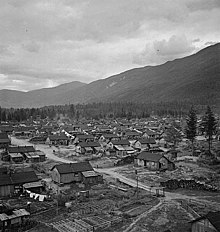Internment
| It has been suggested that this article or section be merged with administrative detention. (Discuss) |

Internment also refers to the practice of neutral countries in time of war in detaining belligerent armed forces and equipment in their territories under the Second Hague Convention.[2].
Early civilizations such as Assyria used forced resettlement of populations as a means of controlling territory,[3] but it was not until much later in the late 19th and the 20th centuries that records exist of groups of civilian non-combatants being concentrated into large prison camps.
Contents[show] |
[edit] Internment camps
[edit] Concentration camps
The Random House Dictionary defines the term "concentration camp" as: "a guarded compound for the detention or imprisonment of aliens, members of ethnic minorities, political opponents, etc.", and, the American Heritage Dictionary defines it as: "A camp where civilians, enemy aliens, political prisoners, and sometimes prisoners of war are detained and confined, typically under harsh conditions."[edit] US and Spanish Camps and first usage of the word re-concentration camp
The earliest of these camps may have been those set up in the United States for Cherokee and other Native Americans in the 1830s; however, the term originated in the reconcentrados (reconcentration camps) set up by the Spanish military set up in Cuba during the Ten Years' War (1868–1878) and by the United StatesPhilippine–American War (1899–1902).[5]. during the[edit] British Camps and the Boer War
The English term "concentration camp" grew in prominence during the Second Boer War (1899–1902), when they were operated by the British in South Africa.[5][6]There were a total of 45 tented camps built for Boer internees and 64 for black Africans. Of the 28,000 Boer men captured as prisoners of war, 25,630 were sent overseas. The vast majority of Boers remaining in the local camps were women and children. Over 26,000 women and children were to perish in these concentration camps
[edit] Polish Camps
Polish historian Władysław Konopczyński has suggested the first concentration camps were created in PolandBar Confederation rebellion, when the Russian Empire established three concentration camps for Polish rebel captives awaiting deportation to Siberia.[7] in the 18th century, during theUse of the word concentration comes from the idea of concentrating a group of people who are in some way undesirable in one place, where they can be watched by those who incarcerated them. For example, in a time of insurgency, potential supporters of the insurgents may be placed where they cannot provide supplies or information.
[edit] Nazi German camps

Because of these negative connotations, the term "concentration camp", originally itself a euphemism, has been replaced by newer euphemisms such as internment camp, resettlement camp, detention facility, etc., regardless of the actual circumstances of the camp, which can vary a great deal.
[edit] List of camps
[edit] See also
- Civilian Internee
- List of concentration and internment camps
- Prisoner-of-war camp
- Extermination camp
- Labor camps
- Quasi-criminal
[edit] References
- ^ per Oxford Universal Dictionary, 1st edition 1933.
- ^ The Second Hague Convention, 1907
- ^ Laws of Hammurabi
- ^ Full text of 4th Geneva Convention
- ^ a b Concentration Camp. The Columbia Encyclopedia, Sixth Edition, 2008.Columbia University Press.
- ^ Documents re camps in Boer War
- ^ Konopczyński, Władysław. (1991) Konfederacja barska, t. II, pp. 733-734.

